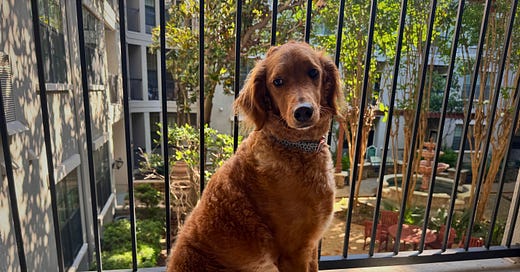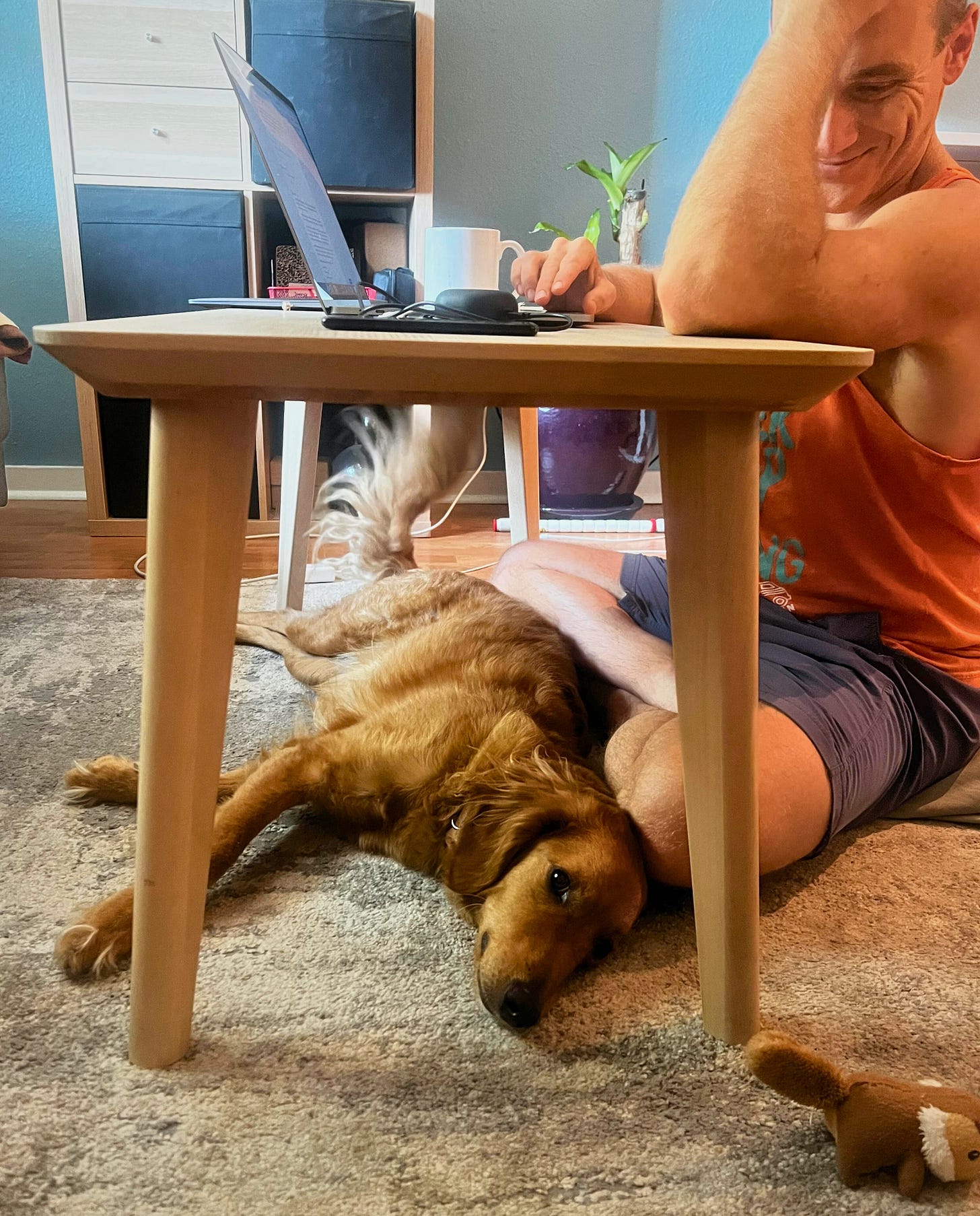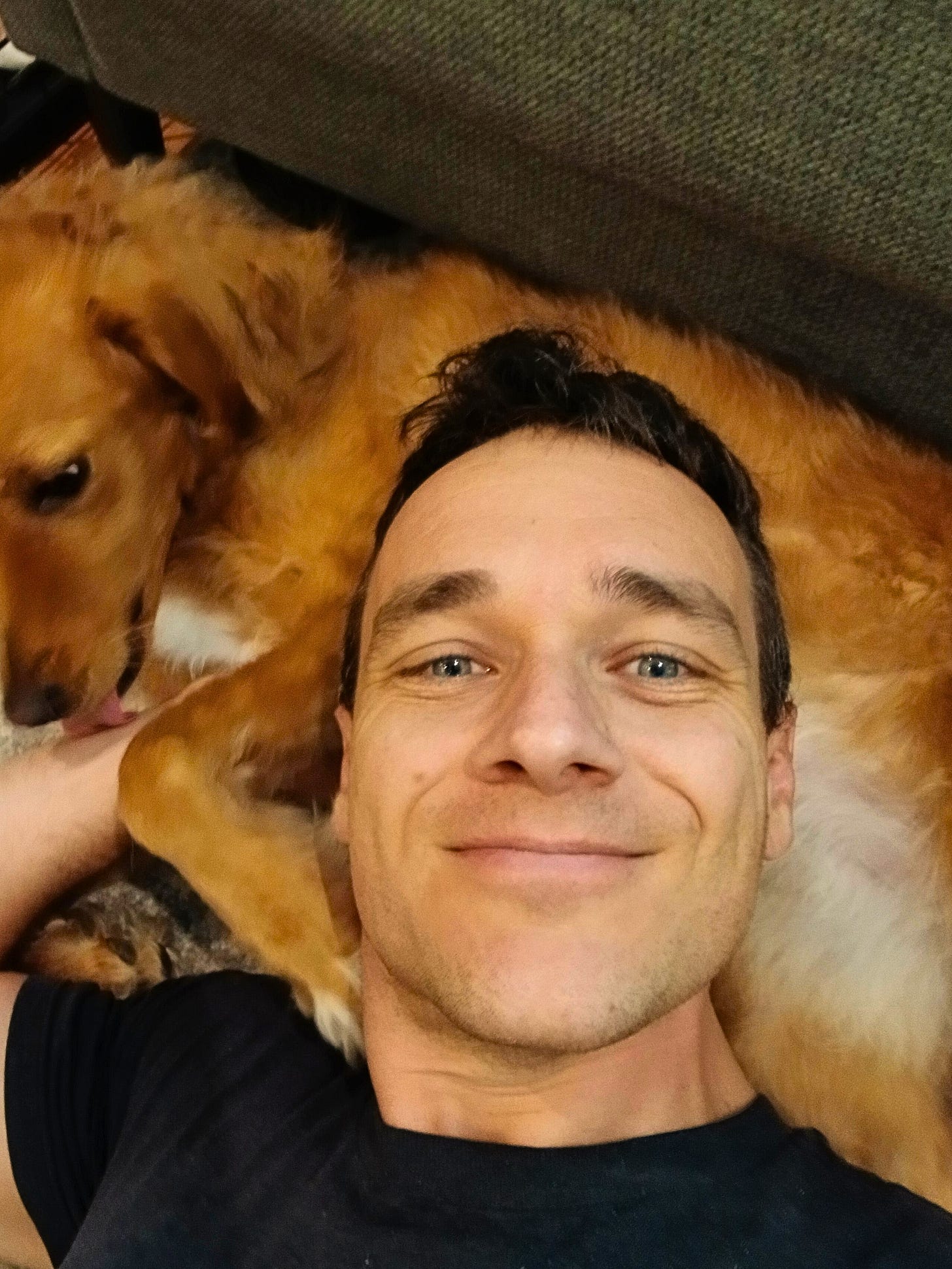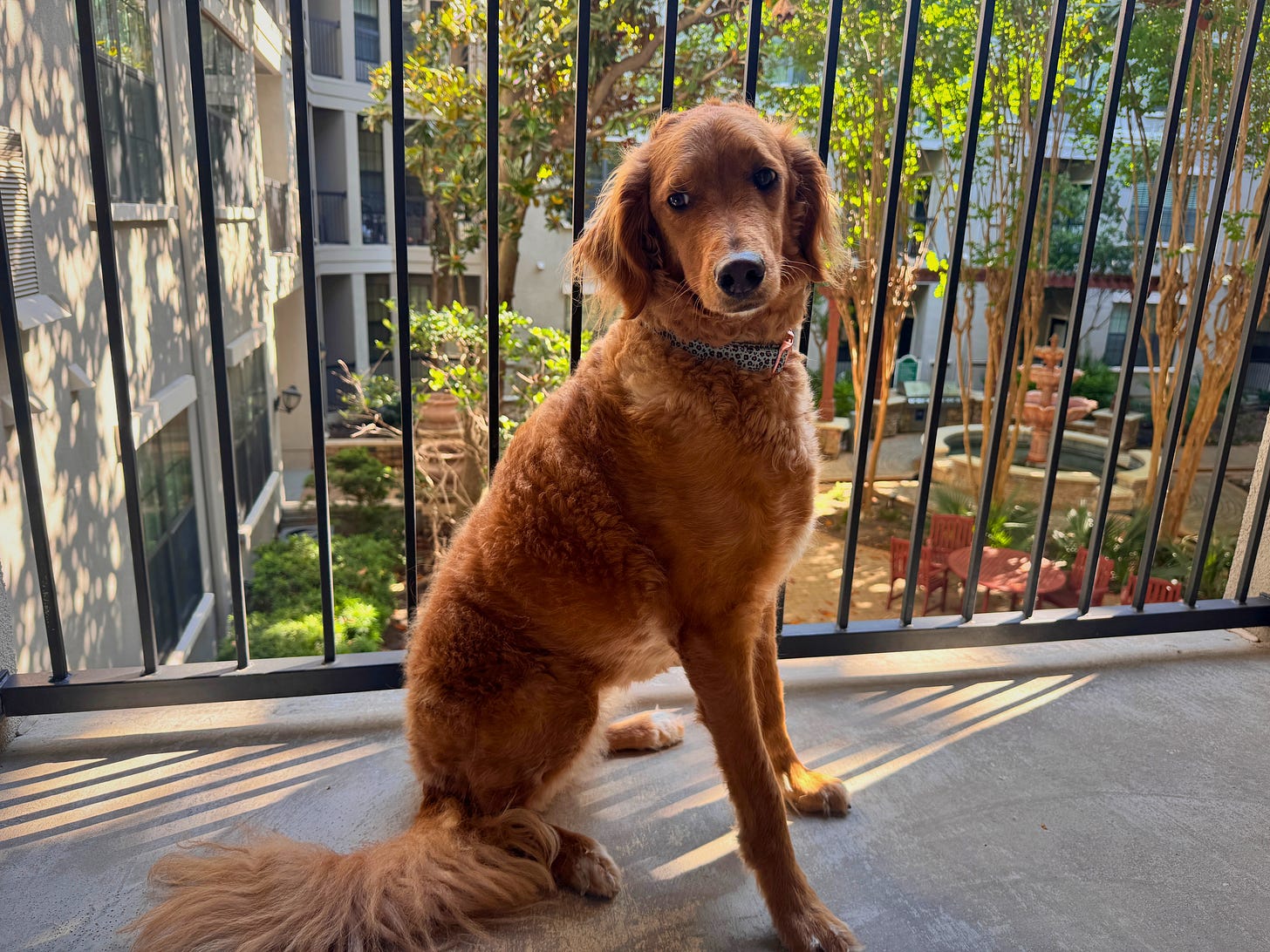Gaia is technically my girlfriend’s dog.
But after meeting her a few times, Gaia made it clear that I was leader of the pack — I had little choice in the matter. And so I’ve found myself co-humaning a dog.
It’s an unexpected position I’ve inhabited for three years now, and I wouldn’t have sought it. I didn’t grow up with dogs, and I didn’t understand them.
As a young man I balked when encountering Socrates’s idea that dogs are first-rate philosophers. In retrospect, my skepticism seems both spot on and completely off base.
Gaia fails Socrates’s philosopher litus test, but her approach to life is a constant rebuke and a reminder of the many ways I’m falling short of my ideals. And ya, I’ve grown pretty damn fond of her.
And since the amazing
has been lobbying hard for the ancient wisdom of dogs, I thought I’d chime in with a slightly different perspective.Gaia vs Socrates:
Socrates: “Your dog is a true philosopher.”
Glaucon: “Why?”
Socrates: “Why, because he distinguishes the face of a friend and of an enemy only by the criterion of knowing and not knowing. And must not an animal be a lover of learning who determines what he likes and dislikes by the test of knowledge and ignorance?”
— Plato, The Republic, Ch 2
While arguing for rule by philosopher kings, Socrates tries to convince Glaucon using his dog as a stepping stone. He says people who love knowledge and truth (and not just opinion) are by nature philosophers. Because Glaucon’s dog loves what's known and dislikes what's unknown, it shows a primitive philosophical orientation. Thus, dogs are philosophers.
I thought this was a weak argument twenty years ago, but after getting to know Gaia, I find it hilariously off base.
Gaia doesn’t consistently embrace the familiar or dislike the new, and her ability to discern friend from foe and safety from hazard are among the weakest I’ve encountered in any living creature. Gaia wouldn’t last a week in the wild unless her irrepressible cuteness convinced someone to save her. What do I mean?
She’s gone into anaphylactic shock three times after eating poisonous bugs — presumably the same one each time. Only steroids have kept her alive. Last fall she snatched a chicken drumstick from the grass on a walk and inhaled it. She began to gasp and sputter and I had to pry her jaws apart, reach down her gullet, and pull it out before she choked to death. She fought me the whole time, desperate to keep choking as long as she got to keep the bone. My girlfriend once loosened her collar, and Gaia Houdinied free and went prancing through a street of speeding cars. I had to slide tackle her on the pavement and carry her to safety. She also regularly swallows sharp wood fragments from sticks and shits blood for days.
It’s like she’s on permanent suicide watch and only constant vigilance keeps her alive.
She’s also deathly afraid of toddlers, garbage men, and baby carriages. She hides behind my legs when the weed whacker guy is outside. And yet when we encountered a screaming, belligerent drug addict who charged up to us with a raised fist last year, she calmly stood wagging her tail, her big tongue out, loving the spectacle.
So no, Plato, I’m afraid I beg to differ. If making useful knowledge-based judgements is a trait of some dogs, I can point out at least one who lacks any trace of it.
But now let me make the case for Gaia’s humbling wisdom.
Let It Go
“Wild animals run from the dangers they actually see, and once they have escaped them worry no more. We, however, are tormented alike by what is past and what is to come. A number of our blessings do us harm, for memory brings back the agony of fear while foresight brings it on prematurely. No one confines his unhappiness to the present.” — Seneca, Letters, 5
For all her fear and suicidal tendencies, Gaia has a trait every human should admire — her ability to move on from the past and live without anxiety for the future.
No matter how scarred or hurt, her time till happy time recommences is measured in moments. Even when half dead from anaphylactic shock, she still weakly wags her tail when she sees me.
Seneca admiringly noted this trait in wild beasts, but it goes for tame ones like Gaia. Or half tame, I guess?
I’m “emotionally disturbed” far less often than her, but how often have I wasted hours or days worrying about what I can’t control — what happened, or what I fear will happen? In this regard I’m no match for Gaia’s grounding in this moment, where it’s always possible to know peace.
Failure ≥ Success:
“Don't demand that things happen as you wish, but wish that they happen as they do happen, and you will go on well.” — Epictetus, Enchiridion, 8
Gaia is a clutz. After spotting me reading on the couch the other day, she jumped up to say hi. Somehow she missed and crashed onto the rug.
Instead of cursing this failure or immediately trying again, she took a moment to look around and notice the new possibilities her failure afforded her.
Her favorite seahorse toy was right by her head, so she grabbed it and gave it a few squeak-filled bites. Then, seeing me smiling down at her, she rolled onto her back, paws in the air — “Belly scratches?”
I couldn’t help but indulge her.
And so we see that Gaia is wiser than I am in this regard too. When I fail, I often wrap myself up in it such that I only see what I haven’t got, blind to the fact that failure has opened up new possibilities that victory would have taken away.
Amor Fati Canīnī
“When a dog is tied to a cart, if it wants to follow, it's pulled and follows, making its spontaneous act coincide with necessity, but if it doesn’t want to follow, it will be compelled in any case. So it is with men too: even if they do not want to, they will be compelled in any case to follow what is destined.” — Hippolytus, Refutation of all Heresies, 1.21
I’d hate being a dog. Most adult humans would.
Sure, they don’t have to work for a living, but they also have no control. They don’t understand the big picture going on around them, and all their significant decisions are made for them. Their fate is mostly out of their hands.
Except…isn’t that a lot like humanity’s situation?
The Stoics drew on the analogy of a dog tied to a cart by a leash to explain fate. The dog wanders freely with the varying amount of slack the leash grants it. But fate is sometimes unforgiving, and no matter how hard we dig in our feet and pull, resisting the cart means getting dragged.
So isn’t it better to work within the restrictions fate grants us? Shouldn’t we be happy no matter what? Gaia has mastered this art.
She eats the same meals day after day, walks the same few routes, owns nothing, buys nothing, sees the same few humans, and loves it all with unflagging joy and enthusiasm. No matter what happens, there’s not a shred of resentment in her.
“By the aid of philosophy you will live not unpleasantly, for you will learn to extract pleasure from all places and things.” — Plutarch, On Virtue and Vice
Gaia loves us. She’s always excited to see us, and never wants to be left behind. But when we leave her with a friend and take a trip, the update videos we get sent show only one thing — a rapturous Gaia, loving life’s every moment.
When things don’t go my way, when my health fails me yet again, it takes effort to remain upbeat. Gaia needs no such prodding. She gives herself no pep talks. She reads no ancient philosophy tomes or self-help books.
This wisdom, this love of any fate, is ground deep into her being.
In this above all else, she is the philosopher par excellence.
Thanks for reading Socratic State of Mind.
If you liked this article, please like and share it, which helps more readers find my work.
You might also like: The best books I’ve read in the last month.








Good morning! I chuckled quite a bit reading this post. I grew up with dogs and they definitely all have the different personalities. Some dogs are smarter than others and Gaia sounds so endearingly goofy and I would imagine would supply nonstop happiness to those around her even if you are on suicide watch.
It’s been many years since I had a dog, we currently have a number of cats. Our travel schedule is not conducive to having a dog, but I think about it often, and it will definitely be part of my retirement when our schedules are a bit more consistent.
Again, have a great morning, thank you for the smiles.
Beautiful, funny, and another great piece in finding the nuance on an entertaining topic like dog philosophy.